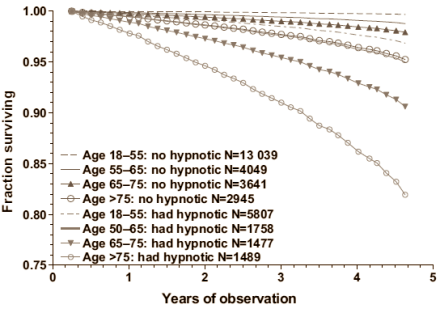|
Definition: "An ergogenic aid is any substance or phenomenon that enhances performance "
|
|
||||||||
07.05.2014 |
|
|
Sleeping pills quadruple mortality risk
Problems sleeping? Go to a therapist, try melatonin or magnesium or tryptophan. If at all possible try to avoid pharmacological sleeping aids. Researchers at the American Scripps Clinic Viterbi Family Sleep Center discovered that even among people who only occasionally take a sleeping pill the mortality risk is four times higher than among non-users.
If you sleep badly, but believe the pharmacological studies that say sleeping pills will make you healthier, you could be making a serious mistake, according to the study that Daniel Kripke, Robert Langer and Lawrence Kline published in BMJ Open. The researchers' interest was piqued by 24 previous studies on the relationship between death and sleeping pills. Of these 18 concluded that sleeping pills increase risk of death.
The researchers collected data on over 10,000 users of sleeping pills from the medical databank of Pennsylvania state. The average age of the users was 54, and they were monitored for over two years. The researchers compared the sleeping pill users with 20,000 non-users.
Even people who only occasionally used sleeping pills – up to 18 times a year – were 3.6 times more likely to die than the non-users, the researchers discovered. The higher the use of sleeping pills, the greater the chance of death.
The researchers were unable to work out from their results how sleeping pills increase mortality risk. They did discover that sleeping pills double the risk of cancer, but that effect was too small to explain the total effect. The researchers suspect that sleeping pills increase the frequency of sleep apnoea, which as a result increases the risk of cardiovascular disease. On top of that sleeping pills make people drowsy, as a result of which people are more likely to have accidents, and users suffer more from stress, suggesting their immune system becomes weakened.
On the basis of their study the researchers estimate that in the US alone 300,000 to 500,000 people die as a result of taking sleeping pills.
They suggest that doctors and consumers need to start reducing the use of hypnotics as they are called. In the long term their effect has been shown to be negligible. [BMJ. 2005 Nov 19;331(7526):1169.] [J Gen Intern Med. 2007 Sep;22(9):1335-50.]
"The meagre benefits of hypnotics, as critically reviewed by groups without financial interest, would not justify substantial risks", the researchers write. "A consensus is developing that cognitive-behavioural therapy of chronic insomnia may be more successful than hypnotics." [Arch Intern Med. 2004 Sep 27;164(17):1888-96.]
Source:
More: |
|


